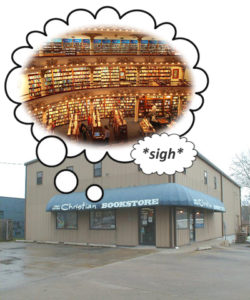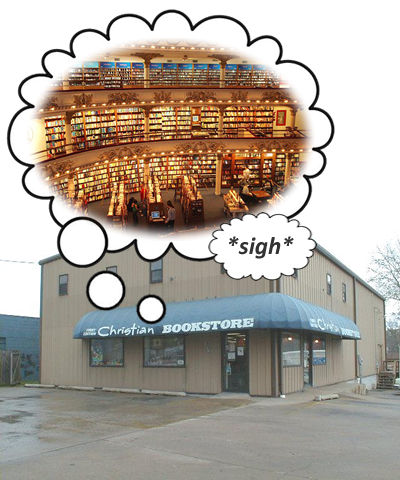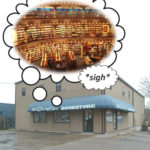Why We Should Write Fiction For Christians, Part 2
 If you as a Christian fiction writer have ever thought something like: I’m tired of Christians sucking up bad stories, and wouldn’t it be better if we all just wrote for non-Christians …
If you as a Christian fiction writer have ever thought something like: I’m tired of Christians sucking up bad stories, and wouldn’t it be better if we all just wrote for non-Christians …
Or: Christians’ stories need to stop the religious jargon; it’s subtlety that matters most! …
Or even something like: the Church already has the Gospel, so we should put our greatest efforts into missional strategies to reach those outside Christianity with better fiction that will meet people where they are and finally show them what real Christianity is …
… Then this series is for you, and me, and any others who are still exploring these issues.
Yet what I’m don’t say — or mean to say, in part 1 or here — is anything like the following:
- Every Christian novelist should give up writing for secular audiences and instead write only for Christians as I hope to do. That would be an overcorrection in reverse.
- Overt messages matter more than craft and Christianity that’s implicit in the very medium of Story. Not at all. I suggest that both showing and telling can make great stories. My hope is not to rebut too much of the “showing is just as good as telling” argument, but to balance out potential overstatements of that. Some authors may choose to explore the Gospel more overtly, while not compromising their craft with smeared-on stale religious sauces that can’t make up for a story’s lack of “meat.”
- My enjoyment of more-“overt” stories matters more than others’ preference for subtler fiction. Not at all. Yet I acknowledge it could sound like that. I do assume you are already familiar with arguments that Christians should mainly write more-subtle stories and that those are usually better than novels that are overtly Christian.
Finally, when I make references to “overt Christian fiction” or “specific grace themes,” I do not mean the superficial stuff that I and most readers here already dislike. While I do believe most modern Christian fiction is beset (along with Gnostic notions about Story itself) more by a lack of truly Christian themes than an overindulgence of them, I also recognize that bad “preachiness” persists. What I have in mind are authors who genuinely, naturally love Christ and His truth, who are unafraid to write with Christian characters, church settings, doctrine exploration, and what-if questions that flesh out or simulate in a story-world (or a mental “holodeck,” as Rebecca Miller said) the specific claims of Scripture and its Gospel narrative.
As stardf29, a friend and cyber-acquaintance of mine, summarized on Aug. 15:
There are definitely books about people becoming Christians, and books that show Christian truths without explicitly mentioning Christianity, but I wish there were more books that were actually about Christians themselves, and how they live their lives. (emphasis added)
I have a feeling he’s not the only one wishing this, from either inside or outside the Church.
That said, here are two more reasons why novelists may write with overt Christian themes.
3. We should avoid “the Gospel is only for non-Christians” lie. Christians need “simulations” of God’s truth at least as much as nonbelievers.
Much poor Christian fiction results from even worse Christian teaching that got its start, or a regrettable boost, in the revivalist “Second Great Awakening” days of the early 19th century.

Another one from Spurgeon.org's "Emergent Motivational Posters." (Works equally well for mean megachurch cattle-herding whippersnappers.)
Whatever the positive results of this movement (we do know God can use anything to echo His Word and save someone, including a secular story!), it also brought many wrong notions to Christianity. Such myths persist in Christians’ minds, and their novels, likely because they infest many churches. Example: the megachurch leader who stated flatly that he didn’t care about the existing Christians in his church because the leader’s goal was mainly to get non-Christians into the church; so those wanting more should quit whining and just work harder. Along with, ah, demonstrating a lack of love for his “partners” in that Christian megachurch business, two false beliefs spawned that leader’s proclamation:
- Once you get “saved,” you are safe. All your growth is now taken care of; you can automatically flesh out the results in your life, and spiritually feed yourself. I don’t need to bother with you. You also don’t need “simulations” of truth in real life.
- Christianity as a pyramid scheme. And you can only get closer to the top if you “save” more people and get them under you. Nothing to do beyond reproducing!
Nonsense. Christians do not believe in Christ simply as a means to get other people saved (who in turn get other people saved, who get other people, who then get others …), but to enjoy forever through worship the One Who saved them. Everything else is a means to that greatest end. Love is a means. Obedience is a means. Any possession of material goods, or lack thereof, is a means. Overt evangelism is only another means. Also a means: our novels.
Moreover, a Christian never goes beyond the Gospel. Plenty of ink has been spilled on that particular truth. Nor are Christians “safe” and thus dispensable once they are touching base. Fleshly temptations, assumptions leading to ignorance, lack of joy — all can tag them.
 So Christians need time in the “holodeck” of vicarious experience to see how their faith may play out in reality. Doctrine and nonfiction can tell how this works. Only fiction can show it.
So Christians need time in the “holodeck” of vicarious experience to see how their faith may play out in reality. Doctrine and nonfiction can tell how this works. Only fiction can show it.
Moreover, who says such overt simulations would not make superbly authentic and original story material that even non-Christians may enjoy? How many secular readers pick up the latest “Edgy” Christian novel that turns out only to echo yet another version of a Salvation Allegory™ or “subtle” call to conversion, and instead say: “Enough of this already; what do Christians actually do after they get converted and they’re on the other side, living life?”
4. Authors reacting only to legalists’ rejections doesn’t help Christians genuinely confused about stories, who need love and reassurances.
In the conversation after part 1, many readers helped me to consider how to communicate better the core assumption I have that apparently informs my thoughts on all this.
It’s very likely my discussion here has been limited through my own hope to craft stories that themselves, secondarily, will serve as catalysts for helping Christians change their views on Story altogether. I have in mind both “it’s just entertainment” types who ignore bad and good stories, and the “fiction is at best useless and at worst violations of the Ninth Commandment” sorts of believers. They need great stories too.
That’s my hope. It may not be yours. But in case it is — don’t feel guilty. You may have a spiritual gift and/or vocation that the Church desperately needs: loving, creative novelists who soak up God’s deep truths out of delight for Him, and in turn allow His grace to radiate from them and win the trust even of those who formerly saw no use in storytelling.
I think that can only happen when such Christians writers understand and apply two truths:
- The genuinely hateful, stubborn church folks who base their piety on laws (Biblical or made-up) and not the joy in Christ to which obedience is merely a means, need more than rebuttals or story anyway. Whether they are real Christians or not, the solution is the same: love, and persuasions to repent and embrace the true Gospel.
- Without God’s work in our hearts, to save and sanctify us, we are all legalists. This sin is common to all. In this life, we’ll never grow out of it. We’ll always fight to recall we didn’t earn our salvation one bit. Yes, we need to “preach the Gospel to ourselves.”
Tomorrow, guest writer Zach Bartels describes two very well-meaning Christians who totally missed the point of fiction. Ugh. Yet Kaci’s recent article also seems a good reminder for us:
It’s a harsh reality that we’re very hesitant to make war with our own sin, and far too often we’re blinded by our own self-centeredness.
If I’m brutally honest, I’m forced to admit it’s easier for me to love these wayward, stiff-necked characters [in a novel] than real people. It’s easier for me to smile and think “Someday [they’ll change]” in the middle of a novel than to pull my head out of the pages, look around, and realize that Jesus loved the Pharisees, too.
And if you’re a true Christian, God loved you also. Sinners and legalists at heart. Haters of Him. He reached down and saved us from our enslavements to self. That should reduce us to tears. And it should make some of us want to reach out in love with our stories to all of our Christian family — including even those who still raise their eyebrows and genuinely repeat old, pious, or Gnostic myths like I only want “useful” stories, or, isn’t fiction just like lying?
How that may be done, then, remains for a later article, likely next Thursday: Stories for Christians: the new ‘watchful dragons.’
Finally, though: has this article helped add clarity? If you’re a writer, have you also considered some of the assumptions I’ve also had about “better” novels, as repeated above? What do you think your callings or readers could be? To what sorts of people do you already feel drawn to show God’s love and truth in your non-writing life, and what spiritual gifts might God have given you to practice in your church? How do they also affect your stories?







































Here’s something I’d like to see: books where Christians (or whatever they’re called in the alt-reality of the story) actually go to church. I get that private Bible study is important, and private prayer time, and one-on-one mentorship. I get that most epic journeys have a mentor-student storyline where the pupil eventually goes on some great quest. I get that it’s easier to write about a character post salvation receiving specific spiritual leadership from a single individual.
But what I don’t understand is why characters enjoying the company of believers in a church setting appears anathema to almost every author I’ve read, even those I’ve enjoyed. I’d like to know who decided that attending regular services is legalistic sin, and only people more consumed with themselves than with God do that. It’s always the small band of Believers out in the boonies doing their own thing that God’s with, not the ones in a church setting.
This comment is turning into a rant, but I am unapologetic on this point: I have just never experienced a situation where too many people went to church (I’ve usually observed the opposite). It drains me every time I read a story where the “right” answer is to abandon the church (again, whatever it happens to be called in the story). Jesus certainly didn’t abandon going to Synagogue, and Paul encouraged believers to gather together. And here’s what I really don’t get: let’s say, for argument’s sake, that you could become just as close to God outside of fellowship as in one (which I don’t believe is even Biblical). Why is it then that these super Believers don’t try to serve the other, less enlightened members of their faith? Church attendance is not merely about sitting in a pew but about using the gifts God has granted you to serve others.
Just once, I’d liked to read about characters who already know and believe, who attend a church, and who don’t necessarily agree on everything but learn to respect and work with each because that’s what brothers and sisters in Christ are called to do. Seems to me that sort of story would be not only powerful but is really needed.
Of course, it would also be harder to write, even in a speculative genre, since it’s far easier to write “Good People versus Bad People.” Especially when “Bad People” are those people who don’t agree with in your church.
Whew, Michelle. That was amazing.
I’ve also wondered how come too many novelists, if they do include Christian characters, seem to like leaving local-church involvement out of the picture altogether. Next week I may discuss more about the possible reasons why, but here are a few:
I had to smile at this, Stephen. As someone who teaches an Elementary Sunday School class, I tell people that I always have eventful Sundays. As you said, if people believe church is boring, they need to reexamine what’s going on. Chances are there’s a lot going on under the surface they’re not even aware of.
I’m glad someone else noticed this phenomenon. I think your point about nervousness over portraying denominational differences may be key. It may be quite unintentional. Perhaps the author doesn’t attend a traditional church with an emphasis on any specific doctrine, or perhaps the author had a bad experience with such a controversy and wants to avoid that sort of thing. But I think it’s disingenuous (to say the least) to pretend as if church attendance, service, and politics are not issues that Christians face.
Nice article, Stephen. I’m looking forward to seeing examples of the “practice” in Part 3, now that you’ve done such a fine job laying out the “theory” of writing for a Christian audience. Some of the comments here are already moving that direction.
In regards to writing about Church life in the context of a story, I think it’s being done, but it’s not being done with high fidelity. It’s either idealized or demonized, though I think it’s hard to write anything candid about what Michelle so diplomatically calls the “eventful” daily affairs of the Church without it being perceived as some sort of critique.
And particularly if you are teaching classes like that, Michelle, and you are a story-lover who is constantly learning more from the lessons than even the children — it brings such great experiences. I have so wonderfully been affected by my roles in my local church, contrary to the usual assumption that all one is ever expected at a local church is give and work and never personally benefit. That, I hope, has also helped this series, and anything else I’ll write — church keeps us “grounded” and unable to follow either our baser impulses or high-minded theory about exactly how things ought to be done. Church and other believers offer the only real-life simulation of faith in action, and later, the New Earth.
Next week, I’m hoping to work more from specific examples than theory (which is mostly what I’ve come up with so far). In theory, it would be great if all Christians saw that fantasy and visionary fiction is the best way to echo the truths of an infinite God in the narrative of an alternate real world. But reality dictates that we work with constraints now. The “watchful dragons” are now watching the church gates.
So who has gained entrance, how was it done, and what have those authors done better than others? That question is non-rhetorical. I could use the help!
There’s C.S. Lewis, of course, but how did he “do it”? What needs (real or only perceived) did he and his works meet in churches? And what about newer Christian visionary novelists who have broken across the niche barrier — who are they? How’d they do it?
I’m also convinced that some Christian visionary novelists should intentionally create stories that not only show (in their poiema) why God-honoring visionary tales are great, but “tell” (in their logos, the story itself) why they are. If some Christian readers are only familiar with direct “messaging,” then one might use that medium to persuade of the virtues of indirect storytelling as well — for creative excellence in the craft of Story itself, not just as a means for Christian propaganda, honors God just as much.
And as for the local church and its lack of direct presence in appropriate Christian novels — I somehow wonder if we need at least one novel that shows more-direct ties between our “mundane” Kingdom work now and the glorious After-world to come. 😀
Very good points. For me, finding a new church was the hardest part of going to college…because it was so important to me.
I’ve been writing science-fantasy stories for years now, and my husband and I are starting to sniff around to see where we might publish them. These articles about writing for Christians was eye-opening for me (as was scrolling through this site’s library).
I’m always on the lookout for a great author, particularly a Christian one. Unfortunately, it’s hard to find really good ones. (I’m coming off a Diana Wynne Jones high, here, and so far I’ve not found any Christian authors to so much as scratch her fantasy.) I’m going to try a few of the folks writing articles on here, because I like their messages and I’d like to see their stories.
For me, that’s what a great story comes down to. A great story. Mind you, it has to be an HONEST story, one without an agenda. I hate agendas. Whether it’s Christian or otherwise, I sniff them out and abhor them. Tell me a story, dangit, don’t preach to me. The first Christian work I’ve ever seen that was honest was Byzantine by Stephen Lawhead. The main character is a Christian monk. He shares the Gospel and has struggles of unbelief as he works through awesome adventures with vikings, being a spy, becoming almost royalty in an Arab household, and more. It was refreshing because the author was honest. There was no agenda. He just showed us this character and his struggles. As the reader, I wasn’t required to squirm about an altar call at the end.
I think it was Madeline L’Engle said something like, Don’t tell a Christian story, just tell a story, and your Christianity will work its way in. That’s what I’d like to do. That’s what I’d like to read.
I haven’t had time to read the post yet, because I scrolled down the page and saw a giant shark lunging out of the water at me, and I literally nearly had heart failure. I am seriously, completely terrified of sharks.
One week later …
And you never came back, Adam. It was the shark image alone that drove you out of these deep waters, right? Not the actual material, right? 😀
(By the way, if you use Firefox, this plugin may help.)
I think the Brits do this so much better. I recall reading (decades ago) novels by Susan Howatch. They seemed to involve people who operated in churches. It seems from what I see that Americans do present churches, but mostly in their Sci-Fi TV series, like Battlestar Galactica and Babylon V. There were certainly meetings in those which resembled what I imagine revival meetings are like. It seems that writers from traditions with a liturgical base can more adequately present church life. But then I haven’t read everything, so what would I know.
To borrow the quote from your article, Stephen:
I wish there were more books that were actually about Christians themselves, and how they live their lives.
I feel exactly the same. Show me a character who is a Christian at the beginning of the book and a Christian at the end — his challenges, successes and failures. Because that’s my life. And I think people want one of two things when they read: to escape, or to see themselves in a character. Sometimes both.
Its nice to see someone addressing that its okay to write for Christians. For a long time I sat on the fence, wondering who I wrote for. Then I realized one day I was writing for Christians. Not that non-Christians can’t read my work, but my core audience is the 20-40 crowd who are either burned out on Christianity or newbies.
Here is a comment I wrote a few months ago that illustrates why we need all kinds of writers and why I specifically write for a Christian audience:
We need both kinds of Christian writers (I actually have 3 categories: writing for CBA, ABA, and those that bridge the two). Not only do we need to write for the lost, I believe we need to write for Christians as well. Not clean fiction, but convicting fiction.
Here is a quote by Mark Driscoll. It was aimed at pastors, but I think it can apply to Christian writers as well:
“So, you have to preach against BOTH sin and religion. Sinners need to repent of sin and religious people need to repent of their man made rules, traditions, holier than thou-isms, and calling things sinful that only their conscience and not the Word of God forbids.”
I write for the religious people, not to assuage their conscious but to remind them, encourage them, or perhaps convict them. The Christian life isn’t about living clean, its about living bold, scary, sacrificial lives. Its about loving the lost, giving up what we cannot keep to gain what we cannot lose, and letting God’s light (not our “clean living”) shine through.
That’s why I would not say I write Christian fiction, I write for a Christian audience. To peel back religiosity and remind them what it really means to follow God. And if a non-Christian reads my book, then I hope they will see a genuine follower of God.
Do you write speculative fiction? I’d be interested in reading it. As the article stated, so much Christian fiction has the Gospel and that’s it. I’d love to read about living the Christian life. Kind of like the Mitford books–they are a wonderful, honest picture of living life as a Christian. (If I’m allowed to mention other genres, here. 🙂 )
Other commenters have remarked about Christians who go to church, and I’m struck with the image of my werewolf character sitting through a sermon on how magic is eeeevil, while squirming and turning red. I may have to write this.
Hey Kessie! Yep, I write speculative fiction 🙂 I laughed when I read about your werewolf sitting through a sermon like that. Luckily my pastor would never preach a sermon like that (I’m married to the pastor lol). But one time we had a congregant give my husband an essay on why fairies are evil. I sat there wondering what the person would think if they knew the pastor’s wife wrote Christian fantasy O.o
Haha, Morgan, that’s a little awkward! And now I’m curious. Why did they consider fairies “evil”? I mean, does it involve the Fae and the Unseelie Fae or something? (Because those guys are pretty mean …)
Come to think of it, you could write a really interesting pro-life story about a couple with a changeling deciding to keep it and raise it. >.>
Thanks, Fred. With part 3 now up — actually it’s sort of a new and different series spun off from this one — that presentation has begun. What are the barriers many Christians put up against solid storytelling? What assumptions are behind them? That also led to what may seem a startling realization: that a lot of existing writers — including Peretti, LaHaye/Jenkins, and even Lewis himself — who seem to have penetrated the barriers, have only done it by playing according to the wrong preconceptions. And in Lewis’s and perhaps Peretti’s case, their works have been reinterpreted or else the moral-pragmatic parts emphasized, to fit in with perceived needs and “usefulness,” wrongly defined.
There’s a lot to critique about churches’ daily affairs. With many of the good nonfiction preachers/authors already doing that, I’d suggest: why ignore that in our novels? Yet the best of preachers/authors/nonfiction types also base their critiques on what’s right about Christ’s Church, and separate local churches, and aren’t merely “anti, anti, anti” all the time. Some church critiques — in art and nonfiction — only emphasize negatives.
From more from Michelle:
That’s what makes the politics so fun (sometimes!). If not fun, they’re at least interesting. And if someone can enjoy a visionary tale with elements that would not be enjoyable in person but are thrilling to experience vicariously — attacked by dragons, etc. — then even the worst parts of local-church life would make for great plots.
I’d hope that the best authors would not only attend but participate in and enjoy, not just a traditional church, but any Biblical church that would emphasize only the simple Gospel and its not-so-simple transformation on all our beliefs, callings, and lifestyles.
Agreed — and it is inauthentic.
I seem to recall an article — I think it was from Randy Ingermanson — calling into question the frequent criticisms of “religious talk” in Christian fiction. To my pleasant surprise, he (or the writer) called that criticism into question. “Hello, cliche or not, that is exactly how many Christians actually speak and act!” he argued (paraphrased). And while good stories should be mindful of cliches (and maybe even gently parody them on occasion), rejecting them or pretending they don’t exist — just like those moments when characters would go to the bathroom — is simply not authentic for more Christians.
From Steve Rzasa:
Whereas when I pick up a typical Christian book, I see mainly Christians (sort of) from other times, or even quasi-Christian (and arguably legalistic) backgrounds and settings (e.g., Amish), or people in the act of becoming Christians or taking a Leap of Faith, or else some hyper-individualized police detective who may live out his Christianity on the job, but is never shown doing what should be an integral part to the Christian’s life: joyful, Gospel-driven, naturally-resulting-from-salvation local church involvement.
Maybe this is the result of another kind of Gnosticism. One kind believes that a novel isn’t “Christian” unless specific content is included. Another kind believes all that “spiritual” stuff belongs in real spiritual life, and would only gum up a good story.